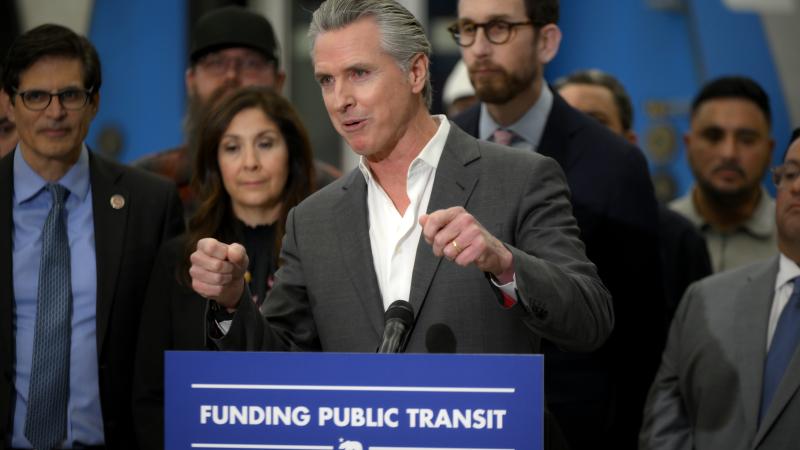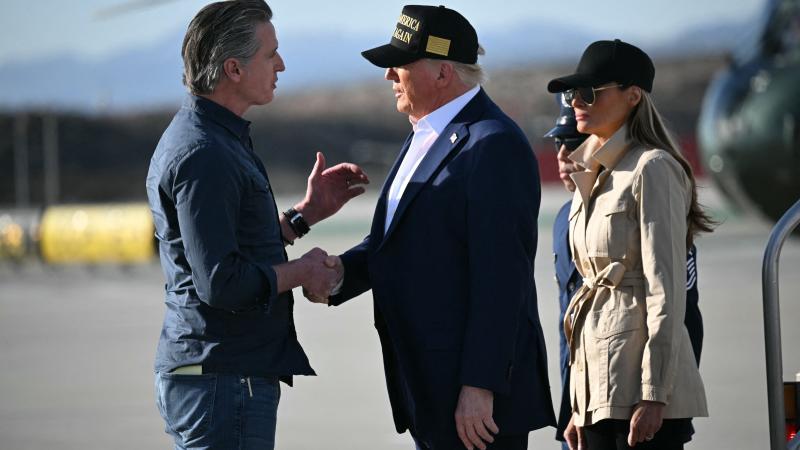As local opposition to wind and solar projects grows, some states seek to override local decisions
“There's a widespread, coordinated effort to force these projects down the throats of rural Americans,” energy watchdog Robert Bryce said.
Legislatures in 23 states and the District of Columbia have passed some form of a carbon-free electricity goal, but many of these measures do not address the ancillary costs of making it happen.
Michigan was the latest, passing a law in November 2023 that requires 100% carbon-free electricity by 2040. Within the law’s “clean energy” goals is a provision that aims to stop local communities from impeding the renewable energy projects.
While the specifics vary from state to state, most of these carbon-free energy goals require a large amount of wind and solar facilities to be constructed, as well as the thousands of miles of associated transmission lines, in a couple decades.
The projects will be costly and take a long time to complete, but one of the larger impediments is the local opposition they face, and some states are taking action to override local authority so the projects can move forward despite the objections of residents.
State control
Energy watchdog Robert Bryce keeps an approximate tally of the wind and solar projects across the U.S. that have been rejected as a result of local opposition. According to Bryce’s Renewable Rejection Database, since 2013, there have been 610 projects rejected as a result of local opposition. The pace of opposition has increased as the number of planned projects increases.
“It is very clear, very clear that from Maine to Hawaii, rural Americans don't want these projects,” Bryce told Just The News. He said the tally is actually 611, but a case in Pennsylvania from last week hasn't been added to the database yet. According to a study by the Sabin Center for Climate Change Law at Columbia University, there are 228 local restrictions in 25 states, and the study notes that the list might not be exhaustive.
The timelines for the 100% renewable energy goals run anywhere from 2032 for the District of Columbia to 2050 in most states. So at most, these states have 26 years to reach their targets.
The Associated Press reports that more than 13 states are looking to grant more authority to state authorities to override local restrictions and decisions in siting renewable energy projects.
When Michigan’s Democratic Gov. Gretchen Whitmer signed its law in November mandating 100% carbon-free electricity by 2040, the law included provisions to grant the state’s Public Service Commission the authority to site large-scale renewable energy projects in order to prevent local governments from stopping them.
Dan Scripps, the chair of the commission, told the Associated Press that the projects are too important to allow local communities to prevent them from being built. “There's a widespread, coordinated effort to force these projects down the throats of rural Americans,” Bryce said.
Illinois passed a law last year that limits local authorities from passing moratoriums on wind and solar projects. Columbia University's Sabin Center study found that in the states of California, Connecticut, New York and Rhode Island, state authorities make permitting decisions for projects.
Laws in Maryland, Massachusetts, Minnesota, New Jersey, New Mexico, Florida and South Dakota, according to the study, give the states power to bypass local decisions blocking renewable energy projects. In Michigan, a group called Citizens for Local Choice, is trying to get a voter referendum on the ballot in November that would return siting of renewable energy projects to local control.
“Local control of zoning is the best way to make sure someone else isn't the next victim of corporate developers,” Kelly Alexander of Emmet County, Michigan, said in a statement on the measure.
Bryce said the concerns about these projects are typically about property values, scenic views and the impacts to the character of their communities. With wind, he said, local residents are concerned about noise pollution. Even the transformers on solar projects, he said, generate noise that concerns local communities.
Tribal opposition
Opposition from tribal governments is also presenting problems for the wind and solar industry.
Tribes in southwestern Arizona opposed the $10 billion SunZia transmission line, which will stretch 550 miles from central New Mexico across the desert southwest. It’s going to be an artery to transport electricity from enormous wind farms to populated areas across the West, especially California.
The tribes argued the project would impact their religious and cultural sites. The Bureau of Land Management temporarily suspended construction, but the agency allowed the project to proceed in November.
The Osage Nation had more success with its opposition to a 150-megawatt wind project after 12 years of litigation. In this case, the objection was over mineral rights. According to the tribe, Italian green energy company Enel illegally mined rock owned by the tribe, and despite being ordered by the Bureau of Indian Affairs to stop construction, Bryce reported in December, the company sped up construction.
A federal court sided with the tribe and ordered Enel to remove the wind turbines, which is expected to cost about $300 million. “This is the biggest embarrassment in the history of the wind industry,” Bryce said. Enel didn’t return requests for comment, but the company has said it plans to appeal the decision.
Besides states’ renewable energy goals, the federal government is also pursuing an aggressive buildout of wind, solar and transmission lines. Wind and solar projects, especially when storage facilities and transmission lines are included, take up more land than any other energy sources.
As renewable energy companies pursue hundreds of projects across the U.S., the number of conflicts with local communities will likely increase.
The Facts Inside Our Reporter's Notebook
Links
- passed some form of a carbon-free electricity goal
- provision that aims to stop local communities
- thousands of miles of associated transmission lines
- Renewable Rejection Database
- a case in Pennsylvania from last week
- Sabin Center for Climate Change Law at Columbia University
- Associated Press reports
- Illinois passed a law last year
- Citizens for Local Choice
- opposed the $10 billion SunZia transmission line
- agency allowed the project to proceed in November
- Bryce reported in December
- cost about $300 million
- the company has said it plans to appeal the decision
- pursuing an aggressive buildout of wind, solar and transmission lines
- take up more land than any other energy sources















